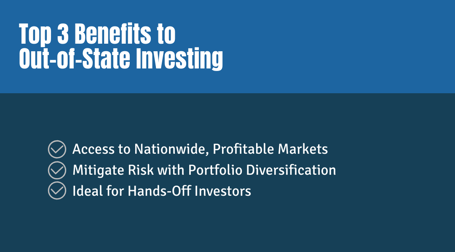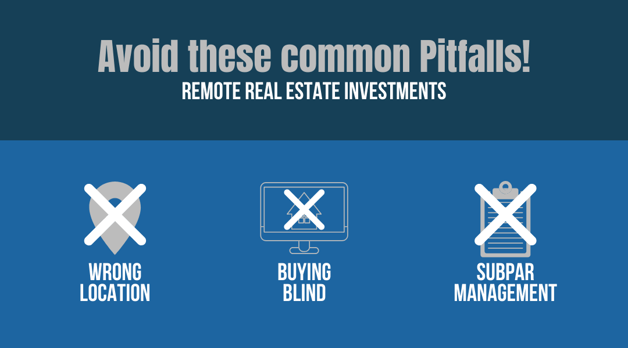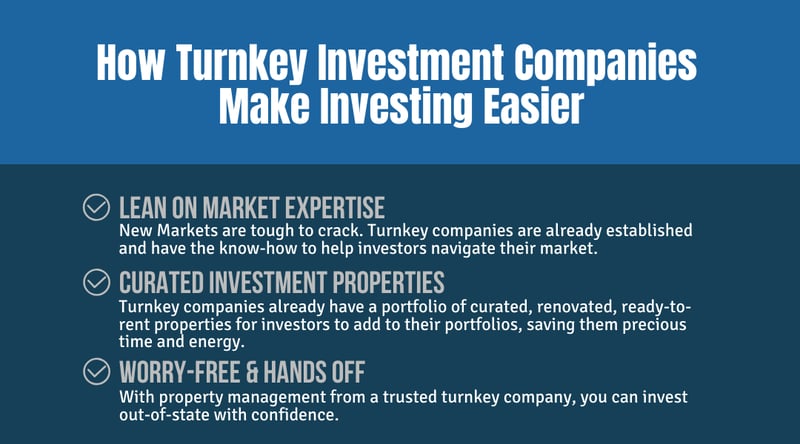 Remote real estate investment: it’s a topic that’s a source of contention among investors. Bring it up, and you’ll have two divisions immediately.
Remote real estate investment: it’s a topic that’s a source of contention among investors. Bring it up, and you’ll have two divisions immediately.
One side will swear by it, saying that they love the freedom they found once they took the plunge and started investing outside of their local real estate bubble, while others will say no, no, no...they’d never dream of investing remotely. They say it’s too risky and too expensive.
Which side is right?
Should you invest out-of-state? Can you find success through remote real estate investment? Is it right for you, or should you just keep your investments local? In real estate, after all, they say location is the single most important factor.
If where you invest matters so much, then the remote versus local debate should probably be talked about a lot more than it really is.
For investors who have stayed local thus far but have wondered about expanding outside of your usual range, we’re going to explore some of the common fears and myths, along with the pros and cons, of investing in real estate remotely—whether that means in another city or in another state, or across the country.
Hopefully, we’ll shed some light on the subject.
Common Myths & Fears About Investing in Real Estate Remotely
The main thing that holds real estate investors from remote investing is the apprehension that comes with the unknown. Some of these excuses are grounded in truth, while others are less true, depending on how you invest and how much due diligence is involved.
These are the most common objections you’ll hear to investing in real estate remotely, broken down:
“Investing Remotely Is Always More Expensive.”
This isn’t necessarily true. Why do people say it? Because everything has to be outsourced when you invest remotely. Because you can’t be nearby, you absolutely can’t take on landlord responsibilities yourself. You have to hire a property management team to manage your properties, and getting someone to do it right can be costly.
But: Getting a company that does it right is a worthy investment in and of itself, especially if you plan on growing your portfolio in the area with that management team.
Not only that, but it’s not always more expensive because of the variations in cost of living and market prices across the country. One of of the main reasons investors choose to invest remotely is because their own local markets are not affordable or conducive to profitable investments, while remote markets are. An investor living in New York or San Francisco, for example, may choose to invest in Florida or Texas. Each investor’s situation is different, and the affordability of remote investing is relative to our local markets.
Don’t rule out opportunity without investigation!
"It’s Too Risky."
Why do investors like to say remote real estate is more risky? It probably has something to do with a few too many horror stories. There are people out there running Ponzi schemes, people out there with fake property listings, and generally bad people out there looking for a quick buck who don’t mind burning someone else to do it.
(By the way, here’s a handy guide on how to recognize a Ponzi scheme.)
A lot of the apprehension and risk associated with investing remotely comes from hearing these stories combined with the unknown. It’s a market you’re unfamiliar with, people you’re unfamiliar with, in a place you can’t get to quickly and easily. For investors who like to be hands on, it can seem like too much to let go and let someone else handle it.
That said, investing out of state doesn’t have to be any riskier than investing locally. With due diligence and a strong network to support your remote investments, it can be just as secure.
"It’s Only for Experienced Investors."
Some real estate investors will insist that remote investing is a venture best left for seasoned veterans. Start off local, they’ll say, and work your way up to investing elsewhere if you feel like you should. But is that really an option for everyone? What if your local market doesn’t offer good investment opportunities? What if it isn’t affordable? What if the population is declining?
Sometimes local just isn’t the best option. New real estate investors needn’t rule out remote real estate investments because of the learning curve. They just need to take it on carefully and with the due diligence it demands of them.
Besides that, there’s also the opportunities offered by alternatives—there’s investing through a turnkey investment company, there’s real estate crowdfunding, or partnering with a more experienced investor in a market that you want to be in.
If you want to be in a market, regardless of your experience levels, there are ways to get in.
"It’s Only Suitable for Commercial Real Estate or Multifamily Properties."
Some real estate investors say that investing in real estate remotely is only worth it if investing in commercial real estate or in multifamily properties. Their logic is that investing in single-family properties, given the cost is takes to hire a property management company, isn’t worth it.
Again, it’s all in the strategy. If you invest in one, or a handful of properties and aren’t in the right market and are paying a lot in management costs, it probably doesn’t make sense mathematically.
But things like partnerships, turnkey companies, crowdfunding, and multiple properties that create multiple income streams can make it make perfect sense. There shouldn’t be a hard and fast rule as to what kind of properties you should and shouldn’t invest in in certain places if the math and the laws all check out.
See for yourself first, run your own numbers, and decide if the strategy works for you in your situation!
While there are kernels of truth to some of the fears and apprehensions surrounding remote real estate investing, there are significant benefits to consider.
Benefits to Remote Real Estate Investment
Open Up Market Opportunities Nationwide
One of the most significant perks to out-of-state real estate investment is simply that it offers unprecedented market access. Investors that lock themselves into a “local only” mindset are limiting their opportunities. When you allow yourself to invest outside of your local bubble, the world opens up—and so do a lot of amazing opportunities. The distinct advantage is that each market is different from yours.
If your current market is challenging, you can go where things are thriving. If your market is unaffordable, you can go where homes are affordable. If you want to invest in a college town, you can take your pick. If you want vacation homes, you can hit any hot spot you want.
Remote investments mean access and opportunity.
Safety in Diversification 
If there’s suddenly an inventory squeeze, the local economy takes a downward turn, or a significant natural disaster, it can literally wipe out an entire portfolio for a local-only investor. It’s like having all of your eggs in one basket. On the flip side, when you invest in multiple market across the country, isolated incidents don’t affect all of your investments.
You can better weather the ups and downs of local economies because they’re distinct and separate, barring a national crisis.
Eliminate the Emotional Attachment
Emotions make things messy. While most investors know how to separate their emotions from their investments, things can still cross a line when it hits closer to home—literally. When you’re closer and more involved, it’s much, much easier to become attached to both properties and tenants. This is especially true for real estate investors who decide to pick up landlord responsibilities.
Property Attachment
An emotional attachment to a property happens in different ways. It can be a “love at first sight” situation where you purchase a property for your portfolio despite its flaws and try to make it work for you even when it isn’t a good fit. It can also be a situation where you’re reluctant to let it go from your portfolio after it stops generating positive cash flow or otherwise turns sour.
Attachment kills your ability to be objective, and that can be dangerous. Granted, this can still happen when you’re in an out-of-state market, but because there’s less familiarity attached to it, it’s less likely.
Tenant Attachment
What about tenant attachment? Most of us think of ourselves as empathetic, understanding people. We want to help each-other out. The closer you are to your tenants, the more you talk, the more friendly you are, the more likely you are to be lenient when you probably shouldn’t be.
Is that harsh to say? A little.
We’re not saying to be cold or aloof: just that a very involved investor has to be more vigilant that professional lines aren’t getting blurred. When you get close to a tenant, you might be tempted to forgive a late rent payment one too many times, when you really should stick hard and fast to your rules.
If you have figurative and literal distance, that’s not going to happen.
Hands Off Investing
The ultimate benefit to investing out-of-state, in our eyes, is that it’s as hands off as real estate investing can get. You don’t have to get lost in the weeds of day-to-day tasks. You’re not getting bogged down in landlord responsibilities. You’re not having to drive out and check up on things. Things are taken care of.
You can focus on your life, on scaling your investments, on strategy, and on enjoying the financial freedom that your investments afford you.
That is, if you’re doing it the right way!
Cons to Consider
Everything has drawbacks. And we’ve always said it: not everyone is cut out for specific types of investing. One style might not be yours! And that’s okay. Consider these cons and if they make a difference to you.
Hiring Staff to Manage the Properties
If you’re dead-set against hiring a property management company, remote real estate investment is 100% not for you. The expense of property management is a deterrent for some, but honestly, we find they’re a worthy investment.
Real estate investors would do well to understand that land lording and property management are entirely different ballgames from investing. Hiring professionals that are invested partners with you is one of the best things you can do for your business.
That said, it’s not a leap everyone is willing or ready to make.
It Is Hands Off
If you’re an investor that can’t stand the idea of being hands off, you will not like investing remotely. If you enjoy getting in there, managing every detail, visiting regularly, micro-managing, and just plain ol’ being involved...the distance will frustrate you. This isn’t necessarily a con, but it just depends on what you like and what you value in real estate investment.
You Can’t Be There If There’s an Issue
If there is a true emergency—a break in, a fire, a natural disaster, a legal issue, or something where the owner really does need to be there and be involved for legal reasons, you can’t get there immediately. It’s not as simple, in most cases, as hopping in your car. If you can drive, it’s not likely to be quick. You may even have to buy a plane ticket to get there, which can be costly on short notice.
The Learning Curve
The reason some investors say that only those with a lot of experience should get involved in remote real estate investment is because new markets take a lot of care and expertise to really master. Your own local market, you know. You’re in it every day, and you’re saturated in it. A new market is just that—new.
Depending on where you invest, that could mean not just learning a new economic climate, but new laws, as well as building up an entirely new Rolodex of contacts and learning who is reliable and who is not. It can be an incredibly long and risky process, especially for the inexperienced.

Beware These Pitfalls!
Picking the Wrong Location
When it comes to investing remotely, there are two integral factors that make a remote market unsuitable for investment:
-
Flagging Economy
If the local economy is going downhill, it’s not likely to make a good place for investments. Pay attention to where things are going, even down to the particular neighborhood.
-
Declining Population
Good, healthy rental markets are those that have demand, and those with demand are those with two things: jobs and people. If a market is steadily losing population instead of gaining, it’s not going to be a good place to invest.
Not Prioritizing Property Management
For those looking to invest out-of-state, property management should be your absolute top priority. They will be your ace in the hole. When you have a trusted property management team by your side, you don’t have to be close by because you know your property is in good hands.
When you don’t prioritize property management, you end up with deteriorating properties, increased property maintenance costs, increased tenant turnover, decreased tenant quality, and more headaches in general.
To neglect property management in out-of-state investments is to set yourself up for failure.
Buying Sight Unseen (Ignoring Due Diligence!)
Even though remote real estate investment is a hands off way to invest, due diligence is a must. We all have heard horror stories about Ponzi schemes and Craigslist scams, and things generally just not being what they seem. Every investor should do their very best to thoroughly research, vet, and inspect every property, partner, and company they choose to purchase or work with.
The Real Estate Investor’s How-To Guide to Investing Remotely
So what exactly is the process to investing in real estate in an out-of-state market? These are the basic steps you need to know!
Step 1) Research Markets
Interested in a market? Start getting to know it! Scope it out through sites like Trulia, City-Data, Redfin, Realtor, and MarketWatch. Determine what factors really matter to you and narrow down your search—you don’t want to try to do too much at one time.
Step 2) Brush Up on Local Laws
Remember, laws can vary from state to state and city to city. Make sure you brush up on local tax and real estate laws to ensure that you won’t be breaking any as you expand into a new market.
Step 3) Start Networking
Who do you need to know? Potentially:
- Realtors
- Contractors
- Property Managers
- Tax Professionals & Lenders
- Home Inspectors
- Other Investors
A good first step may be networking with investors and real estate professional in the area you’re interested in through the BiggerPockets Network!
Step 4) Identify a Worthy Property Management Company
When you know you’re going to invest in a market, who are you going to trust with your properties? Have a few names. Vet your companies. Start asking around and have a company at the ready for when you close on your first property.
Step 5) Select Properties
Start identifying neighborhoods and then potential investment properties.
Step 6) Due Diligence
Once you’ve discovered properties with potential, you can go through the process of property inspections, running the numbers, making offers, and other due diligence required before you close on the property.
Step 7) Start Earning Passive Income!
Once the property is yours, you can hand the reins over to your property management team—they’ll find your tenants, and you’ll start earning passive income!
Other Considerations
Partnering Up
For real estate investors that want to expand into an out-state-market but find themselves apprehensive, another option is to go in with a partner! There are investors that may be keen on the leverage offered by a partnership. It’s a way to have access with the benefit of connections to a remote market.
That said, make sure your partner is someone you know and trust professionally, with a legally binding contract in place.
Crowdfunding
There’s also the option of crowdfunding. Though relatively new and not particularly recommended for resting all of your investments on, crowdfunding is a way to get involved in diverse markets and investments that your local market doesn’t grant you access to.
How Turnkey Real Estate Investment Fits Into the Equation
Naturally, there’s an even better way to invest in a remote real estate market: through turnkey investments! When you partner with a turnkey real estate investment company, you can leverage their experience in an unfamiliar market, drastically reducing the time you need to get started while also having access to experts who have years of experience where you want to invest.
You save precious time that you would spend searching for properties, neighborhoods, and individual companies and realtors. Instead, the steps to earning passive income are reduced to three basic stages!

Cutting Out the Middle Man
Step 1) Identify and Vet Turnkey Companies
The most important thing is to ensure you’re working with a turnkey company with experience and proven success. Remember: they’re not all created equally! Ask around for opinions from other investors. Get proof of renovations. Check their numbers. There are ways to vet turnkey companies to make sure they’re all that they say they are!
Once you’ve identified a company that you think you want to work with, don’t be afraid to ask questions. Dive in and be thorough so that you know exactly what you’re getting in and what their process is—different companies have different ways of operating.
Step 2) Purchase Rental Properties
Some companies may already have rental properties ready for you to purchase, while others may simply help you in your quest of finding good investment properties in the market. Either way, having experienced real estate professionals by your side is a big plus. Turnkey companies greatly reduce the headache of bidding wars and house hunting, something that can be particularly frustrating from a distance.
Step 3) Start Earning Passive Income!
Because many turnkey companies have their own in-house or trusted property management companies, you don’t have to worry about hunting down tenants or companies yourself! In fact, some properties will already have a tenant and will already be generating income by the time you seal the deal!
Really, turnkey real estate is the best, most secure way to invest in real estate remotely. If you have a reliable turnkey company behind you, it’s hard to go wrong.
Are you Interested in learning how to Invest in three of the top
cashflow markets in the nation with Memphis Invest?












